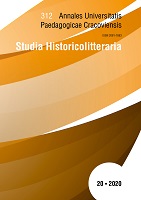Nobile e ignobile simbolismo islamico nella Divina Commedia
Noble and ignoble Islamic symbolism in The Divine Comedy
Author(s): Marino Alberto BalducciSubject(s): Cultural history, Social history, History of Islam, Theory of Literature, Sociology of Politics, Sociology of Religion, Sociology of Literature
Published by: Wydawnictwo Uniwersytetu Komisji Edukacji Narodowej w Krakowie
Keywords: Dante; The Divine Comedy; Jihad; Muhammad; Marco Polo; Riccoldo of Montecroce; Trinity;
Summary/Abstract: Within the mysteries of The Divine Comedy, it seems that the culture of Muslims is well known to Dante, above all thanks to the mediation of works such as the Book of Muhammad’s Ladder (Kitāb al miʿrāj), the Travels of Marco Polo and various writings of friar Riccoldo of Montecroce. Islam is considered a danger, yet it is also admired in Dante’s vision, for its sci entific height reached in the Middle Ages. Love is the essential concept of the whole message of Christianity: it is caritas, a universal embrace that includes every aspect of man and har monizes it. Muhammad, despite his original Christian spiritual formation, according to Dante, did not understand the concept of caritas. Therefore, he deceived others and himself, found ing a new creed and a different faith, which is by no means superfluous from a Dantean point of view. Indeed, it is useless and dangerous as a heresy, due to its same nature that generates schism and, precisely, war. It is natural, in this sense, that Muhammad finds himself in hell in the vision of The Divine Comedy, grotesquely oppressed by his guilt of fraud, because he has shared the circle of love (the all ¬encompassing and Trinitarian perfection of Love) with all the hatred of his anger. However, beyond all the Muslim limits of a culture of submission and the doctrine that arises from it, Dante reveals to us in his Paradise a possible salvation also for Islam (apparently damned); and this for a very subtle yet strong way: the mystical way in its perfect sentimental Truth, which is tolerant, fraternal and inclusive.
Journal: Annales Universitatis Paedagogicae Cracoviensis. Studia Historicolitteraria
- Issue Year: 2020
- Issue No: 20
- Page Range: 3-30
- Page Count: 28
- Language: Italian

